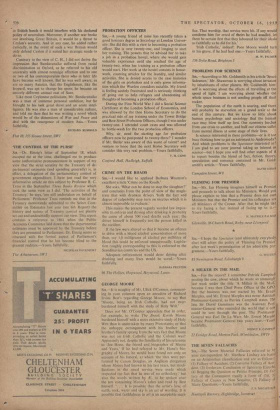SIR,---It is naughty of Mr. Ulick O'Connor, comment- ing in
your columns upon an anecdote of Richard Irvine Best's regarding George Moore, to say that 'Moore, being an Irish Catholic, had not over- burdened himself with the study of Holy Writ.'
Does not Mr. O'Connor appreciate that in order, for example, to write The Brook Kerith Moore burdened himself with a more extensive study of Holy Writ than is undertaken by many Protestants; or that the unhappy estrangement with his brother and brother's family sprang from the very fact that Moore was not an Irish Catholic and the Colonel was? Apparently not, despite the familiarity of his reference to 'Joe Hone, the friend and biographer of Moore and Yeats.' If he had referred to Mr. Hone's bio- graphy of Moore, he would have found not only an account of his funeral, at which 'the rites were per- formed by Canon Douglas. an Anglican clergyman whom Moore had known in his last years, but modi- fications in the usual service were made which respected the fact that he was of no orthodoxy,' but also the words written by /13. to be spoken over the urn containing Moore's ashes and read by Best
himself. . . It is possible that the artist's love of earth, rock, water and sky is an act of worship. It is possible that faithfulness to art is an acceptable sacri- fice. That worship, that service were his. If any would condemn him for creed of theirs he had assailed, let them be certain first that they laboured for their ideals as faithfully as he did for his.'
'Irish Catholic,' indeed! Poor Moore would turn in his grave, if he had had one.—Yours faithfully, M. W. PALMER






































 Previous page
Previous page